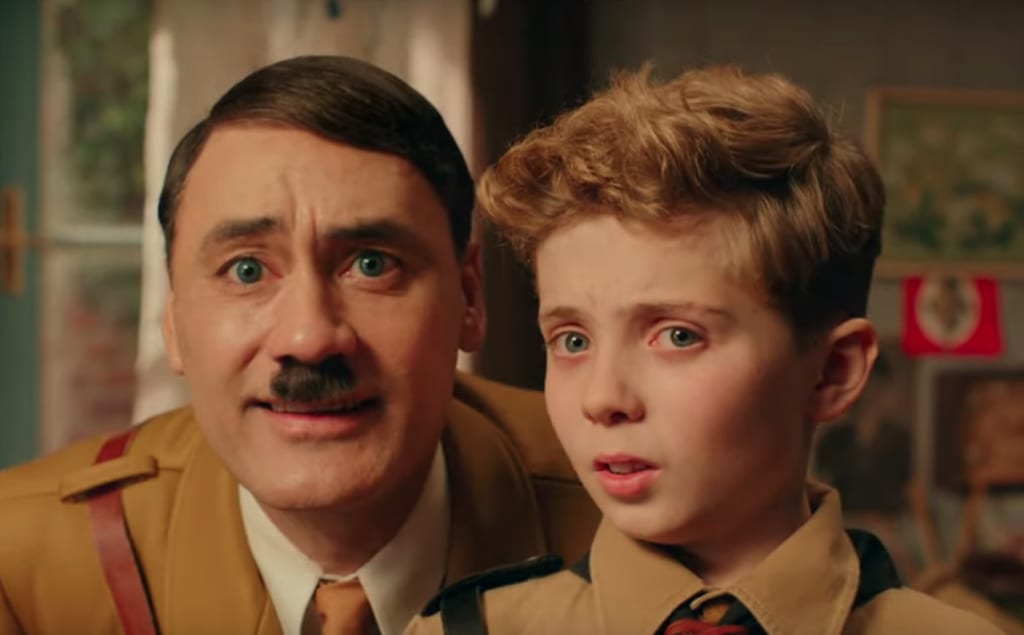Finding Empathy: Jojo Rabbit’s Take on Repeating History
Disclaimer: This is not a review of the film. Instead, this is an exploration of the themes of the film and why I feel they are important in our modern time.

“The way of life can be free and beautiful. But we have lost the way,” said Charlie Chaplin, famed silent film actor in perhaps one of the earliest memorable speeches ever put to celluloid. Chaplin was addressing an English-speaking audience in late 1940. At this time most of Central Europe was under Axis control.
It’s clear that Chaplin was speaking to a much more fractured, more disturbing world but it’s worth noting that the extent of the atrocities committed by the Third Reich wasn’t at that point public knowledge. That being said, general consensus was that to be a Jew in Europe was a precarious prospect.
As ships crossed the Atlantic carrying Jewish refugees — many of whom would be turned away in America— Germany herded them like cattle into ghettos and then into camps, Chaplin made his film, wherein he played a Jewish barber and a political despot much akin to Adolf Hitler.
Taika Waititi’s film Jojo Rabbit, released on Oct. 18 in 2019 owes a great deal to Chaplin’s film, not just for having similar doppelganger Hitlers but also for creating films about finding empathy in a world caught up in the engines of hate.
We are still at a transitory period in the present and therefore cannot determine with any kind of accuracy how we will view our world in the time to come or our politics. But there has undoubtedly been a measurable change over the past couple of years regarding our path forward, especially when it comes to sociopolitical issues. It’s true that we are always in flux, but it can be argued that the path forward has seen a splitting of ideals as extreme as we’ve seen them.
And in that division, our modern age has seen a growth in the visibility of various far-right, white-supremacist groups. For example, Richard Spencer’s National Policy Institute, a white supremacist thinktank headquartered outside of Washington D.C., Mike Enoch’s “The Right Stuff,” an alt-right media network, and podcast “The Daily Shoah,” the latter being a play on Comedy Central’s late-night talk show, formerly hosted by Jon Stewart, himself a Jew by heritage and the Hebrew term for the Holocaust, Shoah. Add to that list The Proud Boys who played a major role in the attempted coup on Jan. 6.
In fact, according to an NPR article, hate groups have seen a 30% rise in the U.S., statistics taken from a report by the Southern Poverty Law Center, a civil rights organization that tracks hate groups. And there’s no denying the effect that hateful rhetoric has taken on young impressionable boys.
The El Paso shooter wrote before attacking a Walmart, killing 20 and injuring dozens more, that his intent was “a response to the Hispanic invasion of Texas,” something that seems to echo the rhetoric of former president Donald Trump, who referred to Mexican immigrants as “rapists” in the led up to his eventual presidency.
The same could be said for Dylann Roof, whose racist ideologies led him to shoot up Mother Emanuel's church in Charleston, South Carolina.
“I did what I thought would make the biggest wave,” wrote Roof, in a prison cell, weeks after the shooting, “and now the fate of our race is in the hands of my brothers who continue to live freely.”
In Charlottesville, at the Unite the Right Rally in Aug. of 2011, a 20-year-old from Toledo, Ohio (my hometown) ran his car through a crowd of people, killing one and injuring others. The driver was a young male. An ex-schoolmate said that the driver would draw swastikas on his notebooks and talk about his love of Hitler as early as middle school.
Add to that the shooting in Buffalo in May of this year, the shooting in the Tree of Life synagogue in Pittsburgh in 2018, and many others most of which were inspired by racist theories of a “Great Replacement” which has been, in-kind, proposed by conservative news pundits like Tucker Carlson.
So then, what does this have to do with Jojo Rabbit, and how does what it does speak to our time?
In May of 2019, The Washingtonian ran a story written by an anonymous author stating that their son had joined the alt-right and had adopted sexist views, and had become a moderator on an alt-right subreddit. Though it’s not clear if this is a true story, it illustrates effectively how a young, impressionable mind might adopt extremist views, views that much like Jojo Rabbit’s titular character gives the individual a place to belong.
“I’m not saying I’m gonna be able to change every single person with this film,” said Waititi of the film in a promotional interview. “But I do feel like it’s an important film for our time right now because I feel like we can never stop dealing with what happened during World War II. Some people might say, ‘Yeah, but that’s so many years ago,’ it’s not that many years ago.”
Waititi has experience helming movies about loners and outsiders. His career was jump-started with his Napoleon Dynamite à la New Zealand film Eagle Vs. Shark, a movie about two socially awkward loners who deal with past trauma and fall in love. The same can be said for Hunt for the Wilderpeople, a movie about a juvenile delinquent who is forced on an adventure with his cantankerous foster father after his loving foster mother dies. Or, the endlessly hilarious, What We Do in the Shadows, a mockumentary about vampires living in modern-day New Zealand that is packed with more heart and much more enjoyable than it should ever be.
Waititi’s career has flourished as of late, too, having helmed one of the better Marvel films, placing a disgraced, out-of-place Thor with a sad, insulated Hulk. The results, much like Waititi’s other films were joyous and heartfelt, injecting genuine pathos into a comedy about superheroes fighting on a planet in which a dayglo-covered Jeff Goldblum is the leader.
It’s with this deft detail and empathy that Waititi makes Jojo more than just a hateful boy but instead, a young man trying to find his place in a world that is offering up false and telling him it is truth.
Jojo becomes a Nazi because it allows him a place to fit in, buying into the propaganda and inventing new propaganda with his close friend Yorki, the two buying into their invented truths about Jewish people, no matter how ridiculous.
The redemption then comes in the second half of the film wherein Jojo is forced to question his ideals and come to terms with the truth underneath all of the propaganda. I won’t spoil it but I will say that it is very much a rather realistic depiction of learned empathy through proximity and understanding.
I wish that I could bottle the joy that I feel when I watch a Waititi film, and save that joy for the coldest, grayest day of winter because on that day, that bottle would genuinely work. Yes, he makes Hitler funny. Yes, he makes a young Nazi kid funny. Yes, he makes Nazis funny (not that that hasn’t been done before). But what makes Jojo Rabbit great and important is that it doesn’t treat hate like an alien ideal that can’t be understood.
Instead, Waititi, who himself plays Hitler, presents Jojo as a sad, frightened boy who just wants to be accepted and who sees Hitler much in the same way that teenagers saw the Beatles in the late ’60s. With Hitler as Jojo’s imaginary friend, he projects an ideal friendship for a confused boy.
Matt Johnson, the 34-year-old director of the 2013 film, The Dirties, a somewhat comical film about two school shooters that effectively displays how, without focusing on the aftermath, and instead on the joy of having a confidant, once suggested in an interview that he wanted to make the main culprit genuinely charismatic and fun to be around, like a good friend, because he thought that making the people who do vile things as something other than human doesn’t allow for a way to solve the problem, it only puts a very small band-aid over a gushing wound.
Jojo does that effectively, using the story of a disillusioned boy (among others) looking for a place to belong and it tries to root out the source of the hate and why they might have gone down the path they did. It gets inside the fervent fanboy nature of hate and finds the root of the ailment, healing it with understanding and comedy, rather than outright alienation and aversion to the offenders.
Yes, it’s important that we don’t fall to the problems of the past, blaming these acts of violence on boys who were just outsiders who had been picked on because we know now that that isn’t always true, and more often than not, the young men responsible for these acts are more often the bully in these scenarios. It’s also important to remember the role America’s lax gun control policies and gun culture, in general, have to play in acts of mass violence.
That being said, Jojo Rabbit, though three years old now and made at a time when Trump was still in office and many were trying to find a way of understanding the hateful rhetoric that was so ubiquitous at the time, it can be argued that the film was a coping mechanism. Perhaps it was a way of saying, “From where does this seed come from? Can I understand it?”
Regardless, the film, though now feeling a bit dated and arguably a smidge too simplified and empathetic towards those who choose racist hatred, especially in the wake of doubled-down politics and the ever-present racist rhetoric. It can be said that the film depicts the accurate environment in which the seed of hatred grows: loneliness and isolation, and a want to belong.
Upon The Great Dictator’s release, because of Chaplin’s choice to play a Jewish barber and because he had spent the time and effort to take down Hitler, it was spread around that Chaplin himself was Jewish. Though Judaism wasn’t seen as bad here in the States at this time as it was in Berlin at the height of Nazi control, Chaplin never made any attempt to correct these reports about his supposed religious beliefs.
In his biography, amongst the fear United Artists had of producing a satire of Hitler, as it might be seen as too controversial or might not play in England, Chaplin later remarked that he was determined to go ahead with making the film anyways.
“For Hitler must be laughed at,” said Chaplin in his autobiography.
About the Creator
Richard Foltz
Hey, my name is Richard Foltz. I refuse to use my first name because it is the name of frat guys and surfers, so...
I've written for years and currently work as an editor for my university's newspaper.






Comments
There are no comments for this story
Be the first to respond and start the conversation.